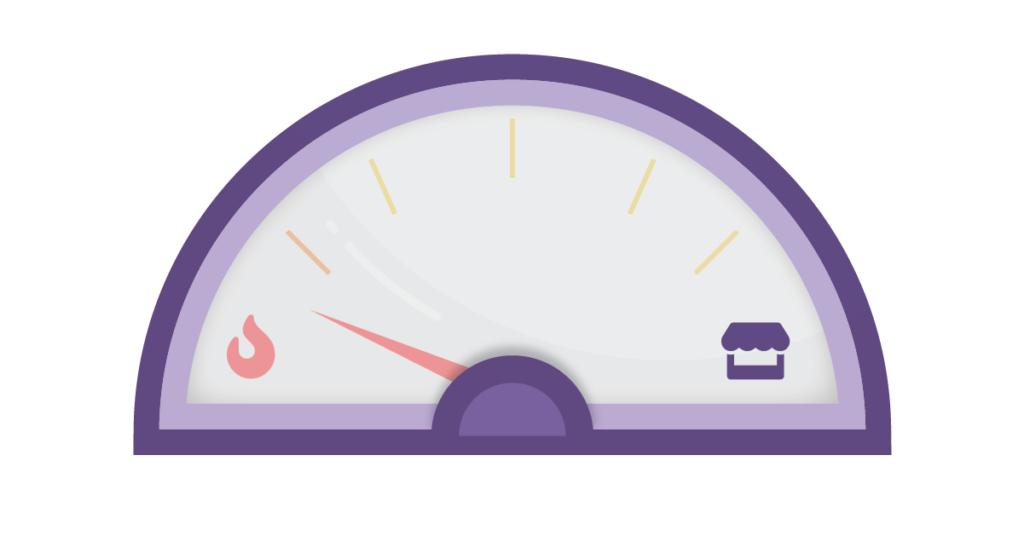Starting an ecommerce business is a popular dream these days, and for good reason.
With all the tools and support out there to help budding entrepreneurs, all you really need to get started is a good idea and enough spare time to get things rolling. Before you know it, you’ll have a sales platform up and running, and will be watching your figures climb.
But beyond these early days, there comes a time in ecommerce when chasing the dream can turn into a grind. The long hours and the high stakes can make burnout a real risk, and for many sole operators, it can feel like there’s no one to turn to for help.
In this post, we’ll talk about how to know when you have the ecommerce blues, and some strategies for climbing out of the rut. With our help, you’ll know when you’re overstretched, and will be able to bounce back and stay on track.
Burnout – more common than you might think
For many people, the opportunity to create their own ecommerce startup is an intoxicating idea. The freedom to chase your personal passion, the liberation from the office job, the opportunity to lay it on the line and succeed on your own terms: it’s not hard to see why the world of ecommerce has seen such sustained growth:
Image source: Statista
At the starting line, you’ll be spitting fire, leaping out of bed every morning ready to take on the world. But day-to-day tasks and responsibilities have a nasty habit of grinding you down.
There comes a time in every business – even in high-performing companies – where the magic can start to fade.
Perhaps you’ll find your sales slowing, or perhaps you’ll have grown to the point where taking care of the critical tasks is too much for you to handle on your own. Perhaps you’ll be struggling to bring in enough revenue to cover costs, and will be facing some hard decisions.
Whatever the reason, chances are you’ll face the prospect of burnout at some point. When you do, there are some tried and tested methods to help you recognise the state you’re in and bounce back.
For the health of your business – not to mention your personal wellbeing – you need to be able to recognise when you’re at risk of burnout, and know what to do about it.
1. Admit what’s going on
The modern culture of business – particularly ecommerce – can make it hard to acknowledge when things aren’t going so well.
Glancing across social media and ecommerce blogs can feel like watching an endless parade of successful innovators and entrepreneurs. They’re all having the time of their lives growing their market share and living the dream.
It’s helpful to remember that people hardly ever broadcast the rougher parts of their experience in the ecommerce industry. After all, the stats don’t lie – the vast majority of ecommerce businesses don’t go the distance. Somehow, those less glowing stories never seem to make it into your Instagram feed.
Every ecommerce owner needs to recognise and address the stigma associated with stress, and the risk of burnout. While people should be able to celebrate their successes, the relentlessly positive projections of business can make it hard for people to admit when they need some help in turning things around.
It’s normal to struggle. At some point, everybody does.
2. Listen to your instincts
It’s easy to forget just how miraculous and complex a machine the human mind really is. We spend so much time under the delusion that we know ourselves and what’s best for our bodies, when our brains are really the ones in the driver’s seat, calling the shots.
If you’re feeling low about some aspect of your business, it may be that there’s something your instincts are trying to tell you. But with all your focus on running the business from day to day, you might not have the time – or the energy – to really listen.
Let’s say, like an estimated 30-35% of adults, you suffer from occasional bouts of insomnia. While this might have its roots in your diet or exercise habits, you might also have something on your mind you haven’t spent enough time thinking about.
Are you worried about your core business viability? Or is it something a little more specific – perhaps your online marketing efforts or some critical customer feedback? Is tax season getting to you? Do you have staffing issues, or do you need to hire someone new?
Whatever it might be, try to schedule some time away from your daily habits and find a way to tune in to what your brain is trying to tell you. Get away from your workplace if you can – a change of scenery can make all the difference.
It can help to have some company here. Find a friend to help talk things over, even if they don’t have the same professional experience. In fact, someone with a different set of experience and skills might approach a problem in a totally different way, and could help you to see things from a fresh perspective.
3. Make a plan and prioritise your tasks
Once you have some time and space away from the day to day demands of your business, you’ll be able to get a better read on whatever is weighing you down.
Now comes the hard part: you need to prioritise your tasks and create a plan to keep moving forward.
This can be as simple as making an itemized list of tasks and deadlines, or as sophisticated as using dedicated time or project management software to map out your business demands. Whatever you decide, be ruthless about prioritising your time, saying no to non-essential tasks, and focusing on the health of your company’s core metrics.
A key step here is knowing what stresses you out. Which of your responsibilities are most likely to keep you awake in the early hours? Is it chasing suppliers? Is it managing your accounting processes? How about responding to customer queries?
Whatever pushes your buttons, knowing your stressors helps you develop strategies to cope with them.
Another key step here is delegating. Often, managing an ecommerce business can feel like being stretched in too many directions at once. But the rise of remote work has made it easier than ever for entrepreneurs to find flexible support from qualified people. No matter where you are, there are plenty of people out there looking for part-time work.
Trust us: having clarity and certainty about the details can be comforting, and can help you ward off the threat of burnout. With a clear plan andby delegating tasks, you’ll soon be back on top of things, and will be better able to steer your business in the right direction.
4. Find the support you need
No matter whether you’re the market leader in online cosmetics sales or managing a side-hustle shipping dartboards from your garage, remember: you’re not on your own. Everyone in ecommerce relies on a network of support, whether they know it or not.
Once you realise you’re at risk of ecommerce burnout, be deliberate about seeking the help you need from friends and family. Often, this is as simple as making time to chew things over, or to spend time together away from your business.
Another great option is to find a network of like-minded entrepreneurs to share information and advice. No matter where you are in the world, there’s likely a rich and diverse business community around you, including others who have faced many of the same challenges.
If such a network isn’t readily available in your immediate area, consider starting one of your own.
Or even better, look for a mentor. This worked wonders for Dsposal, a UK small business. CEO Tom Passmore says this provided “focus, targets, a shoulder to cry on and some really great constructive criticism.”
No matter the particular challenge you’re facing, there are always people out there who have been through it all before, and are happy to share their strategies and tactics. Sites like Find a Mentor may help, or you can tap into your local business network.
Whatever you do, don’t delay – finding early support is critical to your wellbeing, and can help you solve problems before they become too big.
Remember to keep a close eye on the hours you are working and schedule time for the things you enjoy. Treat downtime like a meeting, and defend it at all costs.
As Brittany Berger puts it, “as a solopreneur, time is your most limited resource. You can always make more money, but you can’t make more time.”
Depending on your particular circumstances, you may need to speak to a mental health professional, too. Don’t hesitate to speak to a qualified specialist – no matter what you’re going through. Chances are they’ve helped countless others deal with similar stresses.
5. Face the hard decisions
Succeeding in any business – ecommerce included – is about having a strong and unique idea, and leveraging this idea to create a viable commercial opportunity. More than that, it’s about having the resilience and endurance to push through the hard times.
But the road to just breaking even in ecommerce – not to mention succeeding – can be bumpy. Not every ecommerce opportunity is going to result in triumph. As dogged and persistent as you need to be, you also need to set a limit on the amount of time, effort and money you’re willing to sink into your dream before you decide you’ve had enough.
Part of developing a comprehensive business strategy for your ecommerce operation is about having a clear limit for the hardest decision of all: the decision to wrap things up. If after the first year or two you’re facing mounting expenses, frustrating sales figures, and underwhelming customer interest, you may need to consider calling it a day and pull the plug.
This can be a tough decision, but remember: there’s a whole world out there beyond your business.
Whatever you decide to do, there will always be plenty of other opportunities and alternative ways for you to put your skills and passions to work.
Not every business can be a success, and there’s no point burning yourself out when the numbers simply aren’t stacking up.
Remember, you’re more than your business
You know it well: running an online business can be all-consuming.
From the first flash of inspiration, to establishing your sales platform and building your customer base, through to cultivating relationships with suppliers and growing your bottom lines, there’s a lot at stake, and always more stuff to do. If you move on from being a sole operator to managing staff of your own, things can get even more complex.
It can be easy to let your life become dominated by your company. Unfortunately, once you start seeing everything in business terms, the risk of burnout becomes all that much higher.
It’s easier said than done, but getting some perspective is healthy. There was a time before your ecommerce business, and there will be a time after. Don’t let your entire life become defined by just one thing, no matter how much you love it.
Once you recognize and identify the risk of ecommerce burnout, there are some strategies you can use to get through to the other side. Listen to your instincts, make a detailed plan, prioritise your tasks, and defend your free time.
Beyond that, you need to draw from the networks of support around you. A key step here is to find a community of other entrepreneurs willing to share their experience and expertise.
More important than any of these steps, however, is to recognise that your online business isn’t the be all and end all. Make time to do more of the things you love, and remember that whatever the situation you’re in, there’s always a way through.




